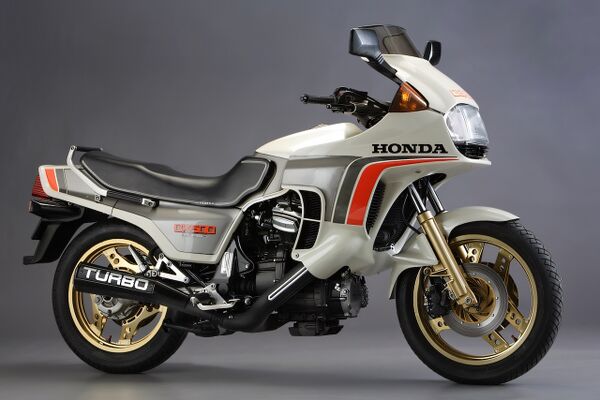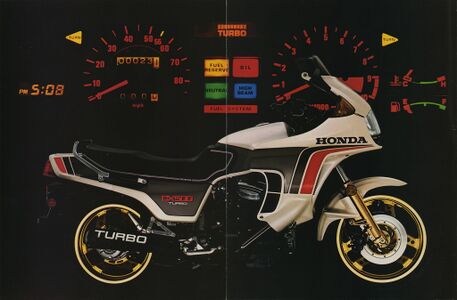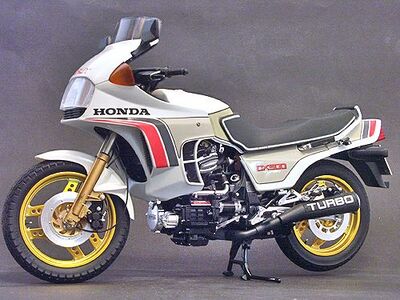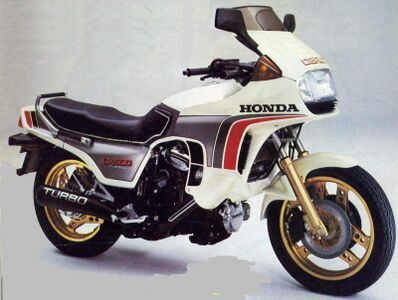Difference between revisions of "Honda CX500 Turbo"
m |
m (→Photos) |
||
| Line 20: | Line 20: | ||
== Photos == | == Photos == | ||
| − | + | <gallery mode="packed" heights=200px> | |
| − | + | File:3440134693 180149729b b.jpg| | |
| − | + | File: Da246de8696e617f42df8333026bade6.jpg| | |
| − | + | File:Honda CX500 Turbo 6.jpg| | |
| − | + | </gallery> | |
| − | |||
{{Ads_feed}} | {{Ads_feed}} | ||
{{ads_post}} | {{ads_post}} | ||
Latest revision as of 00:58, 28 June 2023
The Honda CX500 Turbo sports touring model was officially introduced in 1981 (MY 1982) mainly for the export markets of North America and West Germany. The model was built on the base version of the Honda CX500, but featured advanced front wind deflectors, electronic fuel injection and a turbine. The Honda CX500 Turbo was the first production Honda motorcycle with programmable fuel injection and turbocharging, which increased the maximum power from 50 to 82 hp, compared to the base version.
Another important feature of the Honda CX500 Turbo, like the entire CX500 line, is the 2-cylinder V-engine liquid-cooled, located in the frame longitudinally (like on Moto Guzzi motorcycles), with a camber angle of the cylinders of 80 °. It is also noteworthy that at first the longitudinally located V-shaped (90 °) engine, when tested by the pilots, turned out to be extremely inconvenient ergonomically (the legs rested against the carburetors) - to solve this problem, the engineers had to reduce the camber to 80 °, and turn the block heads by 22 ° relative to the cylinder axis. The motor is equipped with 4 valves per cylinder and a lower camshaft. Also, unlike the basic version, the Honda CX500 Turbo model received a reinforced clutch and gearbox.
Other features of the Honda CX500 Turbo include a steel frame, pneumatically adjustable suspensions (the front fork has a TRAC anti-bite system - Torque Reactive Anti-dive Control), disc brakes, a 20 liter fuel tank, a 5-speed gearbox and 260 kg of curb weight.
1982 was the last year of production of the Honda CX500 Turbo, after which it was replaced by a new model Honda CX650 Turbo, which, however, also lasted only one year.
Turbocharged motorcycle models from other Japanese manufacturers:
Photos
Specifications
Specifications Honda CX500 Turbo:
| Model | Honda CX500 Turbo |
|---|---|
| Motorcycle type | sports and tourist |
| Release year | 1981 (1982) |
| Frame | steel diagonal |
| Engine type | 2-cylinder, 4-stroke, V-shaped (80 °) longitudinal, turbo-supercharged |
| Working volume | 496 cm³ |
| Bore / stroke | 78.0 x 52.0 mm |
| Compression ratio | 7.2: 1 |
| Cooling | liquid |
| Number of valves per cylinder | OHV, 4 valves per cylinder |
| Fuel supply system | injector |
| Ignition type | transistor |
| Maximum power | 82.0 h.p. (60.3 kW) at 8000 rpm |
| Maximum torque | 79.0 Nm (8.1 kg * m) at 5000 rpm |
| Gearbox | 5-speed |
| Drive type | cardan |
| Front tire size | 3.50H 18-4PR |
| Rear tire size | 120/90-V17 (64H) |
| Front brakes | 2 discs, 276 mm, 2-piston calipers |
| Rear brakes | 1 disc, 276 mm, 1-piston caliper |
| Front suspension | 37mm Air Fork with Anti-Peak (TRAC) and Preload Adjustment, 130mm Travel |
| Rear suspension | linkage Pro-Link with pneumatic monoshock (adjustable preload and rebound damping), stroke - 105 mm |
| Motorcycle length | 2260 mm |
| Motorcycle width | 720 mm |
| Motorcycle height | 1345 mm |
| Wheelbase | 1495 mm |
| Saddle height | 790 mm |
| Minimum ground clearance | 150 mm |
| Acceleration to 100 km / h | 4.9 sec |
| Maximum speed | 206 km / h |
| Fuel tank capacity | 20.0 l |
| Motorcycle weight (curb) | 260 kg |
Fuel consumption
The average fuel consumption for the Honda CX500 Turbo is 4.7 to 7.8 liters per 100 kilometers. The exact value depends on the riding style.
Documentation



